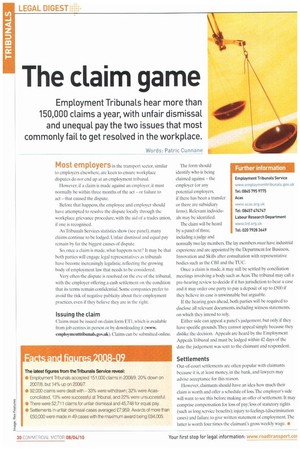The claim game
Page 30

If you've noticed an error in this article please click here to report it so we can fix it.
Employment Tribunals hear more than 150,000 claims a year, with unfair dismissal and unequal pay the two issues that most commonly fail to get resolved in the workplace.
Words: Patric Cunnane Most employers in the transport sector, similar to employers elsewhere, are keen to ensure workplace disputes do not end up at an employment tribunal.
However. if a claim is made against an employer, it must normally be within three months of the act — or failure to act — that caused the dispute.
Before that happens. the employee and employer should have attempted to resolve the dispute locally through the workplace grievance procedure, with the aid of a trades union, if one is recognised.
As Tribunals Services statistics show (see panel), many claims continue to be lodged. Unfair dismissal and equal pay remain by far the biggest causes of dispute.
So, once a claim is made, what happens next? It may be that both parties will engage legal representatives as tribunals have become increasingly legalistic, reflecting the growing body of employment law that needs to he considered.
Very often the dispute is resolved on the eve of the tribunal, with the employer offering a cash settlement on the condition that its terms remain confidential. Some companies prefer to avoid the risk of negative publicity about their employment practices, even if they believe they are in the right.
Issuing the claim
Claims must be issued on claim form ET!. which is available from job centres in person or by downloading it (www. employmenttribunalsgov.uk). Claims can be submitted online. The form should identify who is being claimed against — the employer (or any potential employers, if there has been a transfer or there are subsidiary firms). Relevant individuals may be identified.
The claim will be heard by a panel of three, including a judge and normally two lay members. The lay members must have industrial experience and are appointed by the Department for Business. Innovation and Skills after consultation with representative bodies such as the CBI and the TUC.
Tel: 020 7928 3649
Once a claim is made, it may still be settled by conciliation meetings involving a body such as Acas. The tribunal may call a pre-hearing review to decide if it has jurisdiction to hear a case and it may order one party to pay a deposit of up to £500 if they believe its case is unwinnable but arguable.
lithe hearing goes ahead, both parties will be required to disclose all relevant documents, including witness statements, on which they intend to rely Either side can appeal a panel's judgement, but only if they have specific grounds. They cannot appeal simply because they dislike the decision. Appeals are heard by the Employment Appeals Tribunal and must be lodged within 42 days of the date the judgement was sent to the claimant and respondent.
Settlements
Out-of-court settlements are often popular with claimants because it is, at least money, in the bank, and lawyers may advise acceptance for this reason.
However, claimants should have an idea how much their claim is worth and offer a schedule of lossThe employer's side will want to see this before making an offer of settlement. It may comprise compensation for loss of pay; loss of statutory rights (such as long service benefits); injury to feelings (discrimination cases) and failure to give written statement of employment. The latter is worth four times the claimant's gross weekly wage. •








































































































































